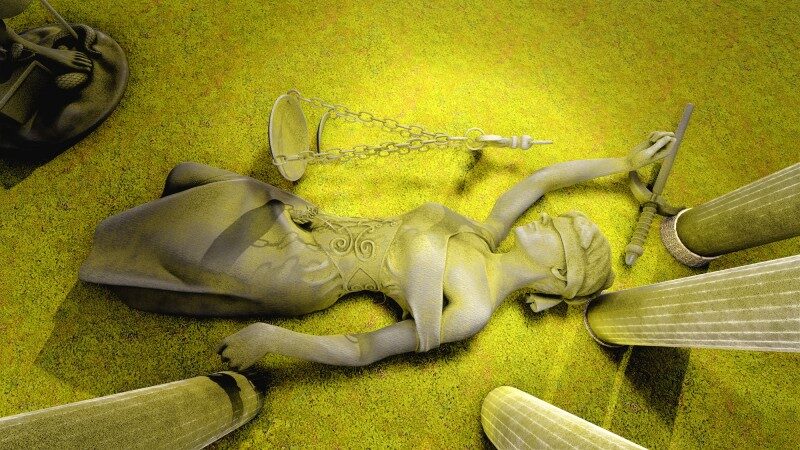
By: Anna-Leigh Firth
Our October Question of the Month asked judges if they feel judicial independence is being threatened. The consensus seemed to be, “Do you even have to ask?”
More than 90 percent of the 787 NJC alumni who responded to the poll said yes, judicial independence is threatened, and an extremely high 64 percent amplified their votes with comments.
The emailed survey form asked those voting “yes” to identify the threats. And a long list of culprits resulted: false or misleading media reports, attacks on judges on social media, recall elections triggered by unpopular (in certain circles) rulings, overzealous ethics commissions, mandatory sentencing, coercive budget cuts from the executive and legislative branches, and more.
But those laments were dwarfed by concerns over the politicization of the judiciary, especially regarding judicial appointments and elections.
Wrote one judge (anonymously, as was most often the case):
“The threat is from the same group that threatens the core of our democracy—individuals with large sums of money who in the past have used their money to purchase legislators or their vote are now using their money to influence judicial rulings from those who stand for re-election or retention.”
Other respondents despaired that judges now have to virtually swear allegiance to the political party in power or pass an ideological litmus test to win appointment.
“At both federal and state levels,” wrote Iron County (Wisconsin) Circuit Court Commissioner Sam J. Filippo, “judicial candidates are increasingly being evaluated on their political party affiliations and whether their judicial records (and writings) meet a political test rather than legal analysis.”
Another predicted, “We are fast coming to a point where unless the president and the controlling party in the Senate are of the same political party, replacement justices will not be selected.”
Mike McGrath, chief justice of the Montana Supreme Court, wrote, “The efforts in the past few years to overtly politicize appointments to the U.S. Supreme Court will significantly undermine the concept of an independent judiciary.”
Many judges identified President Trump as the No. 1 threat to judicial independence, with one accusing the president of lacking a basic understanding of the separation of powers. The anonymous judge complained of the president disparaging the entire judiciary whenever a ruling doesn’t go his way.
Another said Trump’s “perpetual denigration of the judiciary” is “fomenting disrespect for the rule of law.”
But the president also had his defenders.
“If this question is a reference to some fear of Donald Trump or his administration,” commented an unnamed judge, “I think those concerns are absolutely devoid of supporting evidence.”
Another judge warned that judges who express political opinions are themselves undermining the credibility of the judicial branch.
“When Justice (Ruth Bader) Ginsburg goes after President Trump, who would blame the public for questioning her fairness?”
Several judges from West Virginia and North Carolina mentioned the continuing turmoil in their states over efforts to manipulate the composition of their supreme court through impeachments or legislation.
An anonymous judge in Iowa recalled the vote in 2010 that removed three justices of that state’s supreme court who were part of a unanimous decision that legalized same-sex marriage. The campaign to oust them was partially financed by out-of-state interests.
“They knew the stakes when they made the decision and, to their credit, followed the law rather than what the loudest voices wanted,” the unnamed Iowa judge wrote. “The threat is that voices of the parties, the voices of the precedents, and the voices of current law should not be drowned out by political views and agendas.”
The same judge added, “[O]ur government stability is seated on a three-legged stool. When the executive and legislative legs start kicking at the judicial leg, or the public starts weakening the judicial leg, the whole stool falls.”
Among the small minority who disagreed with the notion that judicial independence is under threat, there was this hopeful comment from an anonymous judge:
“I feel a strength among the judiciary that continues to grow. We know we are on the frontlines, and we also know we can weather tough storms. We are a co-equal branch of government, and we will continue to perform our jobs with pride and dignity.”
* Each month the College emails an informal, non-scientific one-question survey to its more than 12,000 judicial alumni in the United States and abroad. The results, summarized in the NJC’s Judicial Edge Today, are not intended to be characterized as conclusive research findings.

CHICAGO – The American Bar Association Judicial Division announced recently that TheNational Ju...

The National Judicial College is mourning the loss of former faculty member Judge Duane Harves, who passed ...

As the world manages an evolving natural environment, The National Judicial College announced today that it...

Do’s Manage your cases systematically Devise a system that works for you and your organizational...

After 22 years of teaching judges, Tennessee Senior Judge Don Ash will retire as a regular faculty member a...